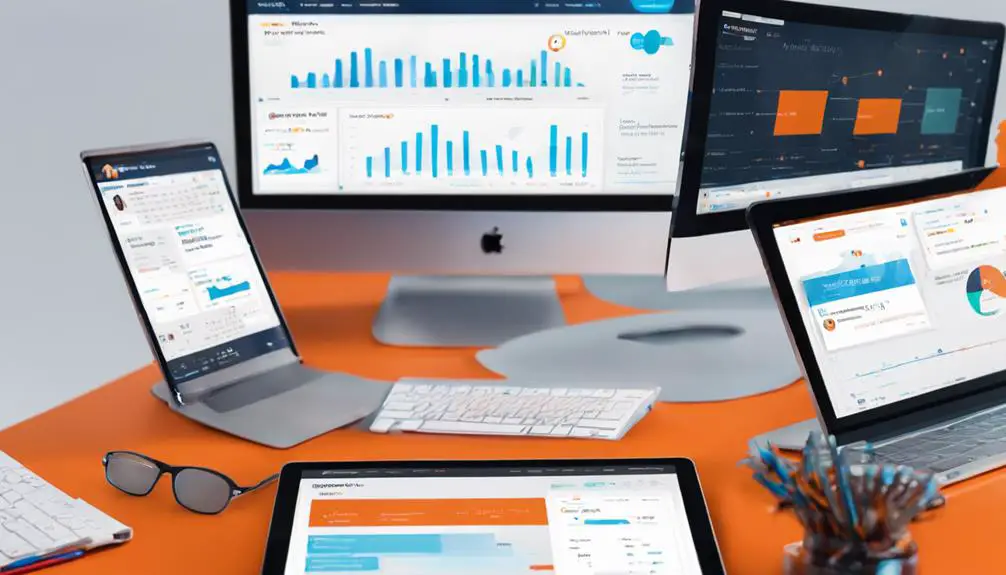Did you know that 63% of companies find it difficult to handle CRM costs? From my experience, picking between Zoho and HubSpot isn't just about price—it's about matching features with your business's unique needs. Zoho offers unmatched affordability and excellent lead scoring for small businesses, whereas HubSpot shines with advanced automation and an intuitive interface for larger enterprises. Before you decide, consider your priorities: Do you need robust email marketing, extensive reporting, or seamless integrations? There's a lot more that can tip the scales in favor of one over the other.
Key Takeaways
- HubSpot is ideal for larger businesses due to its higher pricing and extensive features.
- Zoho CRM offers better affordability with plans starting at $14 per user per month.
- HubSpot provides exceptional automation, content creation, and advanced data management tools.
- Zoho excels in lead scoring, pipeline management, and detailed reporting and forecasting.
- HubSpot supports seamless integrations with multiple platforms, enhancing workflow automation.
Pricing and Plans

When evaluating CRM platforms, it's crucial to consider the pricing and plans of HubSpot and Zoho to determine which best aligns with your business's financial resources and requirements.
HubSpot offers a range of plans, starting from a free choice up to a significant $1,200 per month. This selection caters to various business sizes and needs, making them a versatile, adaptable option. Whether you're a startup or a well-established corporation, you'll discover a plan that fits your budget while providing valuable features.
On the other hand, Zoho CRM offers a cost-efficient solution, with plans starting as low as $14 and peaking at $52 per user per month. Forbes Advisor even recognized Zoho as the top marketing CRM in 2024, acknowledging its value proposition, particularly for small businesses and startups. This makes Zoho a perfect option if you're seeking a robust CRM without overspending.
A comprehensive cost comparison between HubSpot and Zoho reveals that both platforms offer significant flexibility. However, HubSpot's higher-tier plans might be more suitable for larger businesses, while Zoho's budget-friendly choices offer a scalable solution for expanding enterprises. Understanding these pricing structures enables you to make well-informed decisions in line with your financial capabilities.
Key Features
Having compared their pricing, let's now focus on the key features that HubSpot and Zoho offer to help you decide which CRM will better meet your business needs.
If robust lead scoring is a priority for you, then Zoho CRM stands out. Zoho's lead scoring capabilities are exceptional, allowing you to easily assign scores based on set criteria, ensuring your sales team targets the most promising prospects.
On the other hand, HubSpot excels in providing a centralized hub for contact information, which is particularly useful if you're keen on tracking lead behavior across multiple channels. HubSpot's tools can help you monitor and understand your leads' interactions with your marketing efforts, providing valuable insights to drive conversions.
When it comes to pipeline management, Zoho CRM again shines brightly. It simplifies the process by offering intuitive pipeline views and advanced customization options, making it easier to track deals and manage sales activities effectively.
Meanwhile, HubSpot's pipeline management aligns well with its contact centralization, offering a streamlined approach to monitor your sales funnels.
Both platforms also excel in organizing and nurturing contacts, but the choice between them may hinge on your specific need for detailed reporting and forecasting tools, as Zoho offers advanced capabilities in this area.
Email Marketing

Considering email marketing as a cornerstone of successful CRM strategies, let's explore how HubSpot and Zoho CRM's features stack up to enhance your campaign performance.
HubSpot shines by offering thorough email marketing tools in all its plans. You'll find email templates and tracking, which help streamline campaign creation and monitor performance. A standout feature in HubSpot is its advanced automation strategies. By automating repetitive tasks, you can focus more on personalizing each interaction. HubSpot also excels in A/B testing, allowing you to optimize email elements for better engagement. Plus, its lead behavior monitoring gives you insights to tweak campaigns on the fly.
Zoho CRM isn't far behind. With robust email marketing capabilities, Zoho supports effective communication and engagement tracking. One of its key strengths lies in personalization tactics. Zoho enables finely-tuned segmentation techniques, so you can target specific customer groups with tailored messages. This personalization is essential for increasing open and click-through rates.
Both platforms offer tools to tailor your communication strategies. HubSpot provides thorough automation, tracking, and testing features, while Zoho focuses on robust personalization and segmentation. Choose the one that aligns best with your business needs and email marketing goals.
Reporting and Forecasting
After optimizing your email marketing strategies, you'll want to track and measure your success through robust reporting and forecasting tools available in both HubSpot and Zoho CRM. Both platforms offer extensive customization options and data visualization techniques to suit your business needs.
HubSpot's reporting capabilities shine at its top-tier plans. If you're on a premium plan, you can create custom reports that provide an in-depth analysis of your sales performance. These include sophisticated charts and dashboards, helping you visualize your data clearly.
Zoho CRM, on the other hand, includes standard customer reports across all plans. As you move to higher-tier plans, you'll access custom reporting features. Zoho also offers basic sales forecasting tools in all paid plans, with advanced forecasting available as you upgrade.
To help you understand at a glance, here's a breakdown of their offerings:
| Feature | HubSpot | Zoho CRM |
|---|---|---|
| Custom Reports | Premium plans | Available in higher-tier plans |
| Standard Reports | Varies by plan | All plans |
| Basic Sales Forecasting | Not available | All paid plans |
| Advanced Forecasting | Not available | Higher-tier plans |
Using these insights, you can better decide which CRM platform aligns with your business goals in reporting and forecasting.
Expert Recommendations

Based on expert recommendations, Zoho CRM is consistently praised for its affordability and robust feature set, making it an excellent choice for small businesses.
Implementation strategies are essential for maximizing its benefits. For starters, establish a clear roadmap when deploying Zoho CRM. This means defining goals, training your team, and leveraging the support resources Zoho offers.
One of Zoho CRM's standout advantages is its customization options. To tailor it effectively, follow best practices like segmenting your leads and contacts into custom fields that align with your business processes. Experts emphasize starting with a basic setup and gradually incorporating more complex features to avoid overwhelming your team.
Usability tips, often highlighted by users, include utilizing Zoho's extensive library of integration tools to connect with other software your business already uses. For example, integrating email and marketing tools can streamline communication and lead management.
Keep an eye on task tracking and lead conversion reports – these features aren't only user-friendly but also crucial in understanding your sales pipeline.
Despite some mobile app limitations and occasional system glitches, Zoho CRM remains a cost-effective and highly recommended solution for small businesses looking to enhance their CRM capabilities.
User Interface
When evaluating CRM platforms, you'll find that HubSpot's user interface stands out with its visually appealing and well-organized design, making it easy to navigate and use. The platform's design aesthetics enhance the user experience with attractive graphics, contrasting colors, and dynamic elements. It's a treat for the eyes and makes finding what you need quick and effortless.
HubSpot's navigation is impressively efficient. Its categories are organized smartly, ensuring you never get lost while performing various tasks. This visual appeal contributes to a seamless user experience, making HubSpot particularly user-friendly.
In contrast, Zoho's interface, while clean, may lack the same level of clarity. With 13 tabs in the top navigation bar, it might feel overwhelming for some users. The dashboard focuses more on text-oriented elements and basic dropdowns, giving it an older design feel.
To help you visualize the differences, here's a comparison:
| Feature | HubSpot | Zoho |
|---|---|---|
| Design aesthetics | Visually appealing, modern | Clean but older design feel |
| Navigation | Efficient, well-organized | 13 tabs in top bar, might overwhelm |
| Dashboard Style | Attractive graphics, dynamic | Text-oriented, basic dropdowns |
Choosing between the two boils down to your preference for design aesthetics and navigation efficiency. If the visual appeal enhances your user experience, HubSpot might be the better choice.
Onboarding and Support

While a user-friendly interface is critical, understanding how a platform supports you during onboarding can make or break your experience. HubSpot's onboarding process stands out with its thorough training resources, including robust onboarding guides, real-time automated demos, and a dedicated hub packed with learning milestones. This structured approach streamlines the user experience, making it easier for you to immerse yourself and get productive quickly.
The familiar dashboard design and well-organized, visually-oriented interface reduce the learning curve noticeably.
In contrast, Zoho's onboarding process isn't quite as polished. Zoho offers fewer training resources, relying more on limited YouTube guides and seminars. This approach often means you could spend more time figuring things out, affecting your initial user experience. Additionally, the somewhat less intuitive interface might extend your learning curve, making the onboarding journey a bit more challenging.
When it comes to customer support, HubSpot excels with extensive community forums and guides that provide additional layers of assistance. Zoho, while providing customer support, simply doesn't match the breadth and depth offered by HubSpot.
If quick, efficient onboarding is your priority, HubSpot's detailed and user-friendly experience is a notable advantage.
Platform Functionality
To truly maximize your productivity, understanding the core features each platform offers and how they align with your business needs is essential. HubSpot stands out with its advanced capabilities in automation, content creation, and workflows. If you need a platform that helps you streamline marketing efforts with dynamic elements and attractive graphics, HubSpot is your go-to. Its easy navigation and visually appealing interface make it user-friendly and engaging.
HubSpot also offers robust data management features, ensuring that your data is accurate and accessible. Customization options are rich, allowing you to tailor workflows and processes to fit your unique business requirements. This can greatly enhance your efficiency and productivity.
On the other hand, Zoho shines in project management functionalities and focuses heavily on CRM basics. This makes it a strong contender for businesses needing thorough project tracking features. However, users have reported data syncing issues and instances of missing data, which can impact your overall experience. Zoho's interface design is more text-oriented and less visually appealing, which might require a steeper learning curve.
Integration Capabilities

Maximizing your CRM's potential hinges on its ability to integrate seamlessly with the tools you already use. Both HubSpot and Zoho excel in this arena, but they offer distinct advantages depending on your needs.
HubSpot CRM integrates effortlessly with popular tools like Gmail, Outlook, Slack, and Zapier. This integration enables smooth data synchronization and allows for extensive automation workflows. With HubSpot, you can streamline communication, ensuring every piece of customer information is up-to-date.
Zoho CRM shines with integrations to Google Workspace and Microsoft Office 365. It's perfect for enhancing productivity and collaboration within your team. Its robust API customization and third-party apps integration capabilities also make it a versatile tool for centralizing your operations.
Here's a quick comparison of their integration capabilities:
| Features | HubSpot CRM | Zoho CRM |
|---|---|---|
| Email Integrations | Gmail, Outlook | Google Workspace, Microsoft Office 365 |
| Team Communication Tools | Slack | Slack (via Zapier) |
| Automation & Data Sync | Zapier for extensive workflows | In-built tools with extensive API options |
Maximizing automation workflows and utilizing third-party apps integration is easier with both CRMs, but the choice boils down to your specific needs for API customization and data synchronization. Either way, both platforms promise to streamline your business like never before.
Conclusion
After diving deep into Zoho CRM and HubSpot, it's clear each shines in its own way.
Did you know that 70% of startups prefer Zoho for its affordability and detailed reporting? If you're a small business focused on budget and insights, Zoho's your best bet.
But if automation and sleek design appeal to you, HubSpot's ideal for larger enterprises.
Choosing the right CRM isn't easy, but understanding your specific needs makes all the difference.

